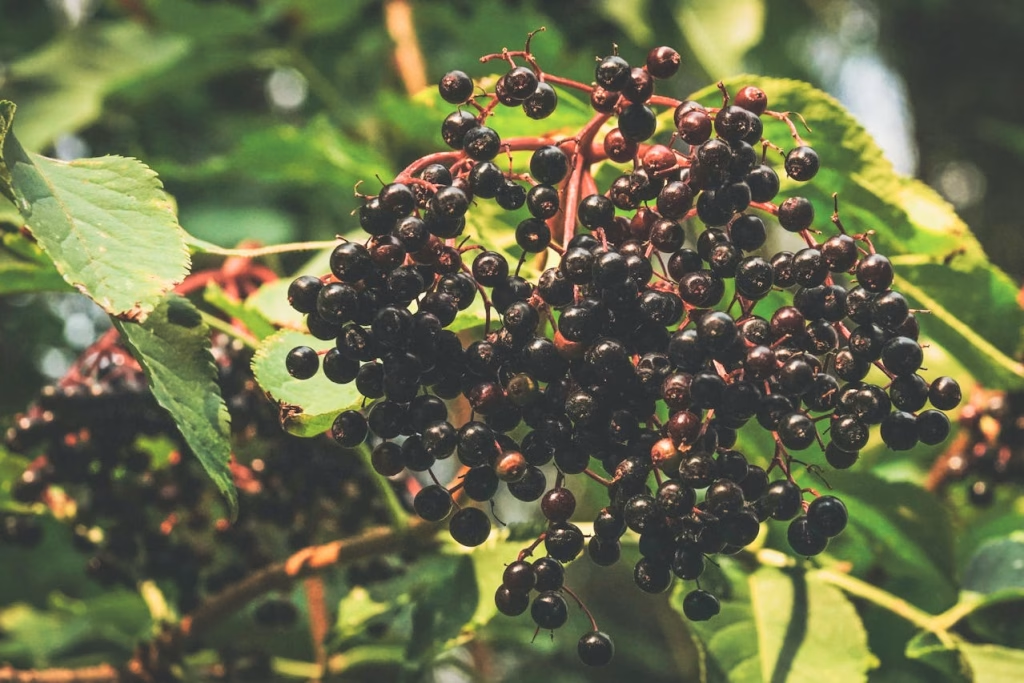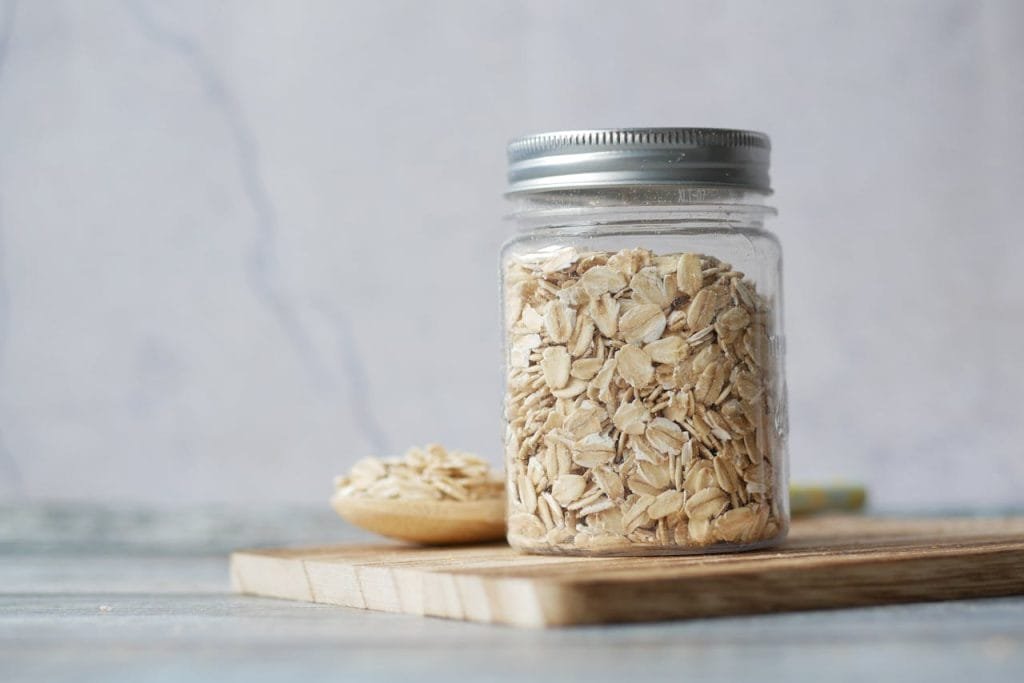Is it worth paying extra for organic food, or is it just another wellness industry trick to make us spend more money?
When it comes to healthy eating, we all know that avoiding processed food and eating a whole-food diet is the way to go. But what about conventionally grown and organic food? Is there a massive difference? Is it worth paying extra for organic food, or is it just another wellness industry trick to make us spend more money?
As with everything online, there are different points of view. Some people say food is food, as conventional pesticides are strictly regulated, and we should not bother paying more for organic food.
Some argue that organic food is way better for our health as it is more nutritious and clear of chemicals and pesticides, and we should only eat organic food.
A third group of people acknowledge the importance of organic but also understand that conventionally grown vegetables and fruit are better than no fruit in one’s diet.
So, who is right? Let’s dig in. Is buying organic food worth it?
What does organic food mean?
The term “organic” refers to how food is grown and processed. While specifics can vary by country, some core principles define organic agriculture worldwide, including restrictions on synthetic chemical pesticides and fertilisers, non-GMO seeds, and a focus on environmental sustainability and animal welfare.
Is organic food free of pesticides & fertilisers?
The use of pesticides in organic farming is tightly regulated, and only biopesticides or ‘minimum risk pesticides’ are allowed. Pesticides allowed in organic agriculture are not synthetic or “human-made”. Only organic pesticides can be used for organic food, with a few exceptions.(1)(2)
There is also a chance of contamination of organic food with synthetic pesticides. For example, if a neighbouring farmer grows conventional produce, or the same food-sourcing plant handles organic and conventionally grown food.
So the answer to the question is NO, but organic food has very strict regulations, and organic fruits and vegetables have smaller amounts of pesticide residue than conventionally grown food. (3)
Organic Food Categories & Approval Organizations
Organic products are often categorised based on the percentage of organic ingredients they contain:
- 100% Organic: Made with 100% organic ingredients.
- Organic: Contains at least 95% organic ingredients.
- Made with Organic Ingredients: Contains a minimum of 70% organic ingredients.
Several organisations are responsible for the certification and approval of organic products. Some of the most recognised include:
USDA Organic (United States)(4)
EU Organic (European Union)(5)
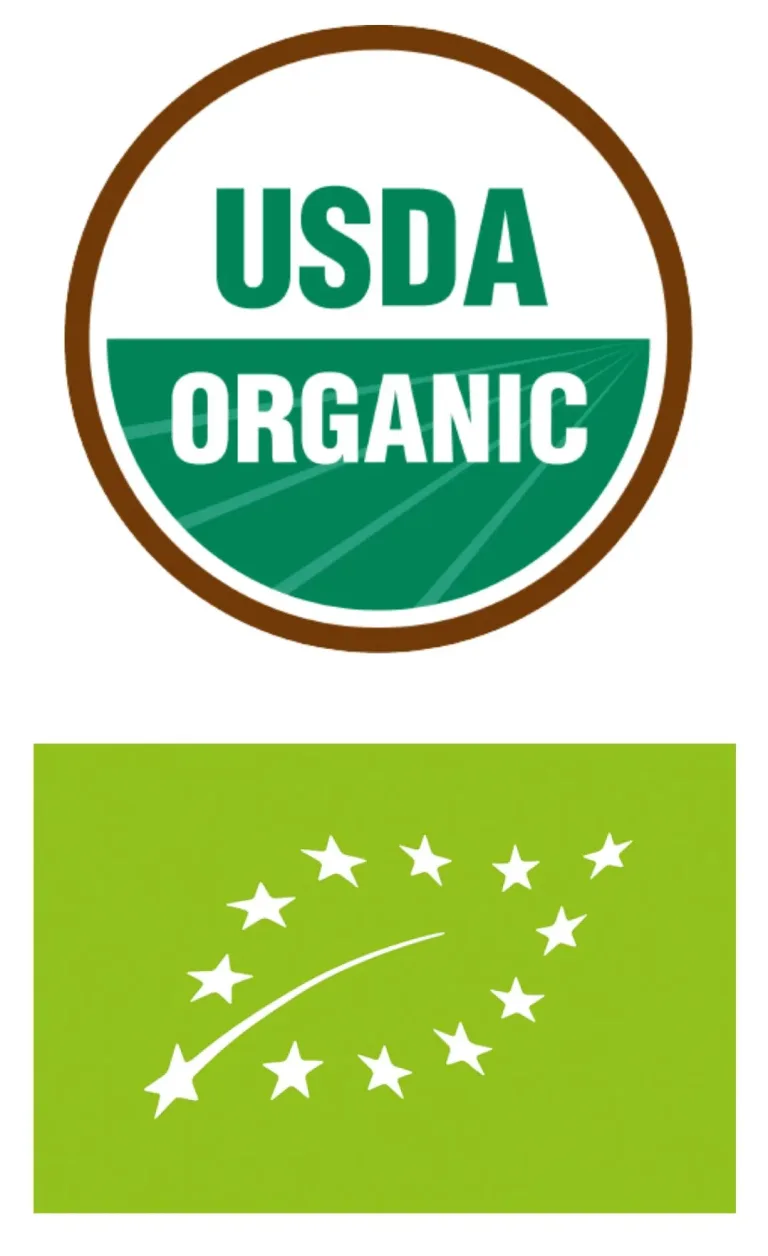
What are the benefits of organic food?
The benefits of organic food can be split into health, environmental impact, and social considerations. Here are eight points listed for you to decide if organic food is worth it.
1. Reduced Exposure to Pesticides and Chemicals
As mentioned, organic farming restricts synthetic pesticides and fertilisers, leading to lower pesticide residues in food. (6)
2. Nutritional Benefits
There are studies concluding that the nutritional benefits of organic food compared to conventionally grown food are insignificant. However, some studies suggest that organic foods have higher levels of certain nutrients and minerals.
“It appears that the intake of organic foods leads to some advantages, such as the ingestion of a higher content of phenolic compounds and some vitamins, such as vitamin C”(7)
“Organic food contains lower levels of contaminants and higher levels of antioxidants compared to conventional food, with consumers potentially better evaluating their health status.”(8)
The higher levels of nutrients can be attributed mainly to richer, healthier soil in which organic produce is grown.
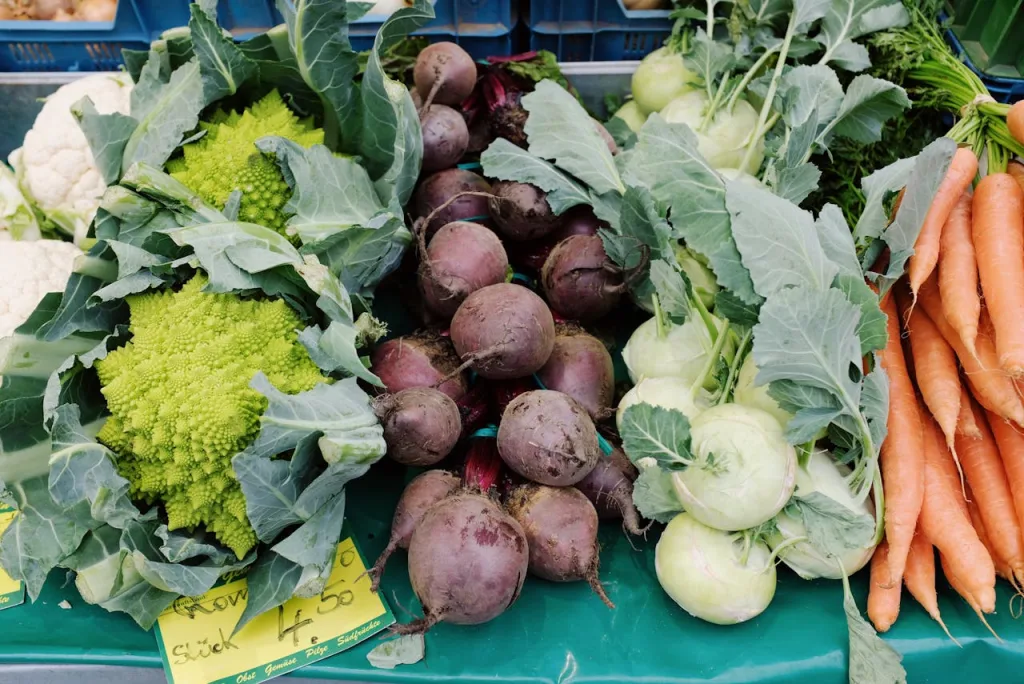
3. Environmental Sustainability
Organic farming reduces pollution and conserves water and soil quality. Organic food production often emphasises renewable resources, soil conservation, and water conservation, contributing to biodiversity and ecological balance.(9)
4. Animal Welfare
Organic standards should ensure better living conditions for farm animals, promoting natural behaviours and health. There are not many studies on the welfare of organic farm animals. Two recent studies done in EU confirm better Animal Welfare in Organic Farms, but both state that there is a need for improvement. (10)(11)
Organic farms provide access to outdoor spaces and organic feed and restrict antibiotics and hormones. This leads to the next benefit of Organic food.
5. Antibiotic and Hormone Avoidance
By avoiding antibiotics and growth hormones in livestock, organic practices help reduce the risk of antibiotic-resistant bacteria, which is a significant public health concern.
“Reducing antibiotic use in livestock can reduce the risk of antibiotic-resistant bacteria in humans and their spread through faecal-oral transmission and consumption of antibiotic residues in animal food products.”(12)
6. Taste
Some people prefer the taste of organic food, attributing this to better soil health and the absence of synthetic pesticides and fertilisers in the growing process. Some studies found a slight (28%) increase in the taste of organically grown vegetables (13) , but some studies argue that it is just a perception:
“Beliefs about the taste of organic and local foods can play a stronger role in taste perceptions than actual taste for certain segments of consumers.”(14)
In my experience, not all organic food tastes better than conventionally grown food. To experience the best taste, it is important to choose local, in-season fresh food.
7. Supports Local Economies
Organic farming often involves small to medium-sized farms and can support local economies. Buying local organic food also reduces the carbon footprint associated with long-distance food transportation.
8. GMO Avoidance
Organic foods are produced without genetically modified organisms (GMOs).
I only recently learned more about the dangers of GMOs while completing Dr T. Colin Campbell’s Plant Based Nutrition Certificate Course , but if you are short on time, you can also read this very informative article by Jonathan R. Latham, PhD.
Is organic food worth it?
Organic food is way more expensive than conventionally grown food, but it is for a good reason. It takes longer to grow, needs more care, and lasts shorter. However, it is better for us and our planet in the short and long term.
Buying organic is a privilege that not everyone can afford. And, of course, just because something is organic doesn’t mean it is healthy, and just because something is conventionally grown or doesn’t have the Organic Approved label is bad for us.
If you can’t afford or cannot find organic whole food where you live, don’t stop eating healthy food just because it is not organic. Just make sure to wash your strawberries before you eat them.
To conclude, yes, organic food is worth buying if it is available and you can afford it.
What to Buy organic in 2025 – from dirty dozen to clean fifteen:
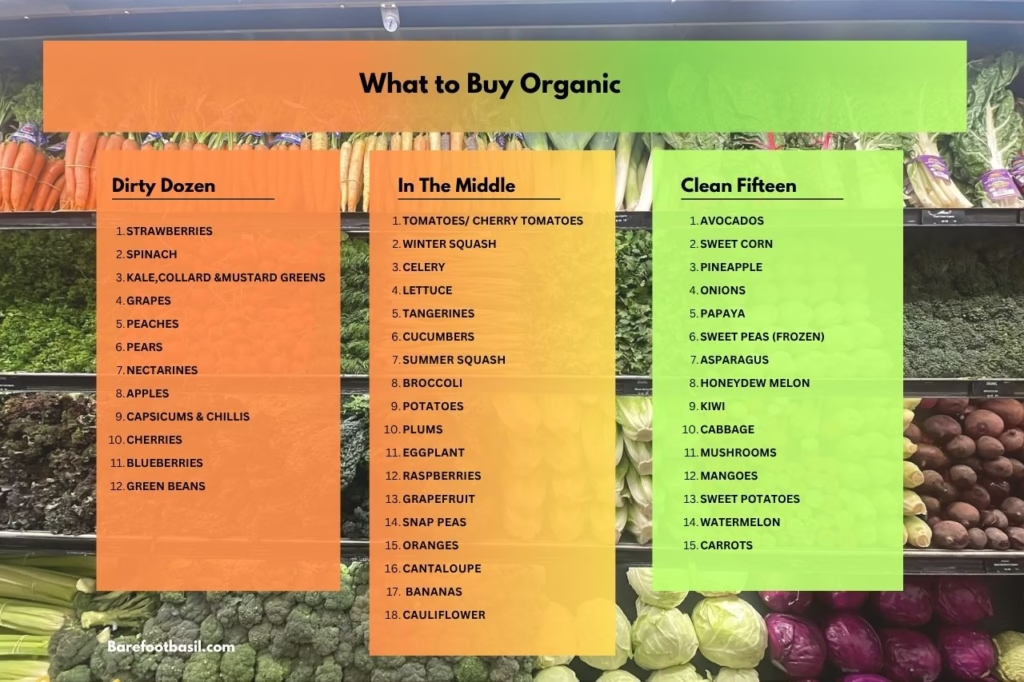
With food prices going up and up, I have created this list that you can print out and stick on your fridge for reference. It lists the Dirty Dozen- the foods that have the most pesticides, the middle section that is not too bad, and the Clean Fifteen, which have the least pesticide residue, according to EWG.
- Pesticide ingredients used in organic agriculture http://npic.orst.edu/ingred/organic.html
- http://npic.orst.edu/ingred/ptype/natbio.html
- Organic and conventianaly grown food http://npic.orst.edu/health/ovc.html
- https://www.usda.gov/topics/organic
- https://agriculture.ec.europa.eu/farming/organic-farming/organics-glance_en
- Rani, L., Thapa, K., Kanojia, N., Sharma, N., Singh, S., Grewal, A., Srivastav, A., & Kaushal, J. (2020). An extensive review on the consequences of chemical pesticides on human health and environment. Journal of Cleaner Production, 124657. https://doi.org/10.1016/j.jclepro.2020.124657.
- Lima, G., & Vianello, F. (2011). Review on the main differences between organic and conventional plant‐based foods. International Journal of Food Science and Technology, 46, 1-13. https://doi.org/10.1111/J.1365-2621.2010.02436.X.
- Rembiałkowska, E. (2016). Organic food: effect on nutrient composition. , 171-177. https://doi.org/10.1016/B978-0-12-384947-2.00505-5.
- Scialabba, N., & Müller-Lindenlauf, M. (2010). Organic agriculture and climate change. Renewable Agriculture and Food Systems, 25, 158 – 169. https://doi.org/10.1017/S1742170510000116.
- Duval, E., Keyserlingk, M., & Lecorps, B. (2020). Organic Dairy Cattle: Do European Union Regulations Promote Animal Welfare?. Animals : an Open Access Journal from MDPI, 10. https://doi.org/10.3390/ani10101786.
- Wagner, K., Brinkmann, J., Bergschmidt, A., Renziehausen, C., & March, S. (2021). The effects of farming systems (organic vs. conventional) on dairy cow welfare, based on the Welfare Quality® protocol.. Animal : an international journal of animal bioscience, 15 8, 100301 . https://doi.org/10.1016/j.animal.2021.100301.
- Hu, Y., & Cowling, B. (2020). Reducing antibiotic use in livestock, China. Bulletin of the World Health Organization, 98, 360 – 361. https://doi.org/10.2471/blt.19.243501.
- Zhao, X., Chambers, E., Matta, Z., Loughin, T., & Carey, E. (2007). Consumer sensory analysis of organically and conventionally grown vegetables.. Journal of food science, 72 2, S87-91 . https://doi.org/10.1111/J.1750-3841.2007.00277.X.
Bernard, J., & Liu, Y. (2017). Are beliefs stronger than taste? A field experiment on organic and local apples. Food Quality and Preference, 61, 55-62. https://doi.org/10.1016/J.FOODQUAL.2017.05.005.
Silvija Meilunaite, PN1-NC, CSMC, is a certified nutrition and menopause coaching specialist who writes about midlife health, nutrition, and evidence-based wellness. She focuses on research-driven approaches to feeling better in your 40s and beyond, with a special interest in low-tox living and supportive daily habits.



